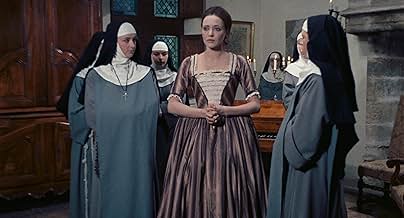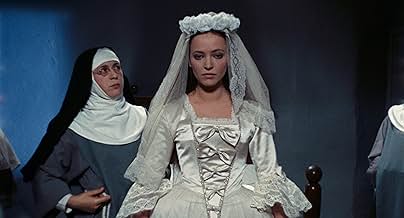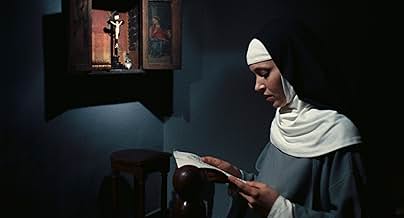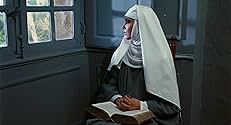IMDb RATING
7.5/10
3.4K
YOUR RATING
Suzanne is forced against her will to take vows as a nun and three mothers superior treat her in radically different ways. Suzanne's virtue brings disaster to everyone.Suzanne is forced against her will to take vows as a nun and three mothers superior treat her in radically different ways. Suzanne's virtue brings disaster to everyone.Suzanne is forced against her will to take vows as a nun and three mothers superior treat her in radically different ways. Suzanne's virtue brings disaster to everyone.
- Director
- Writers
- Stars
- Awards
- 2 nominations total
- Director
- Writers
- All cast & crew
- Production, box office & more at IMDbPro
Featured reviews
Playing a role that few people thought would ever fit her and shadowed by vultures predicting disaster, Liselotte Pulver delivered the surprise coup of many a cinematic season in the icily directed 'La Religieuse'.
Ms. Pulver, the beloved eternal comedienne of the German cinema, has taken on that most daunting role: the lesbian Mother Superior, the ultimate debauched nun in the ultimate 'Why was the Revolution necessary?' tale, Denis Diderot's grand tale 'La Religieuse'. Working against type and expectation under the direction of Jaques Rivette, Ms. Pulver has created the most complex and compelling portrait of her long career, and she has done this in ways that deviate radically from her former screen roles.
Ms. Pulver's Mother Superior, emerges in this adaptation with her monumental weakness intact. But something new and affecting is simmering within the character, a damning glimpse of self-awareness. You get the sense that if her frantic movement stops for a second, she'll deflate into a small and bitter creature.
In films like 'Die Züricher Verlobung' and 'Das Wirtshaus I'm Spessart' Ms. Pulver's persona has always been that of a delectable waif, a vulnerable creature with a heart of gold. Here she was cast against type and rumors went that she did not get along with Mr. Rivette. And then, halfway through the film, there she was, and for the first time in her long career she didn't look remotely like an ingénue.
Ms. Pulver's portrait is so intimate and persuasive that you aren't allowed to step back and think, 'What a monster she is.' That's because, thanks to this actress's willingness to turn herself and her character inside out, you've been inside her mind. What a sad and fascinating place it is.
Ms. Pulver, the beloved eternal comedienne of the German cinema, has taken on that most daunting role: the lesbian Mother Superior, the ultimate debauched nun in the ultimate 'Why was the Revolution necessary?' tale, Denis Diderot's grand tale 'La Religieuse'. Working against type and expectation under the direction of Jaques Rivette, Ms. Pulver has created the most complex and compelling portrait of her long career, and she has done this in ways that deviate radically from her former screen roles.
Ms. Pulver's Mother Superior, emerges in this adaptation with her monumental weakness intact. But something new and affecting is simmering within the character, a damning glimpse of self-awareness. You get the sense that if her frantic movement stops for a second, she'll deflate into a small and bitter creature.
In films like 'Die Züricher Verlobung' and 'Das Wirtshaus I'm Spessart' Ms. Pulver's persona has always been that of a delectable waif, a vulnerable creature with a heart of gold. Here she was cast against type and rumors went that she did not get along with Mr. Rivette. And then, halfway through the film, there she was, and for the first time in her long career she didn't look remotely like an ingénue.
Ms. Pulver's portrait is so intimate and persuasive that you aren't allowed to step back and think, 'What a monster she is.' That's because, thanks to this actress's willingness to turn herself and her character inside out, you've been inside her mind. What a sad and fascinating place it is.
one of films who reflects inspired vision about Diderot's novel and high performances. one of the most impressive roles for Ana Karina and touching science for explore the detail for Liselotte Pulver. a film as puzzle of delicate nuances. subtle, cruel, delicate, precise, touching. and surprising for the atmosphere and for the image. reflecting the spirit of a period, it becomes a gem. for the grace and for the cruelty. for the vulnerability of each character and for the force of the lead character. for the beauty of image. and for the art of Jacques Rivette to use a theme in the most convincing manner. a film about freedom. and the fight for it.
As the ruthless Diana Monti in Georges Franju's 'Judex' (1963), Francine Berge (soon to be seen in Philippe Garrel's forthcoming 'La Lune Cravee') had attempted to abduct virginal young heroine Jacqueline Favreaux (played by Edith Scob) while disguised as a nun. Three years later it's now Anna Karina she has in her clutches as the cruel Sister Sainte-Christine.
As it reels from one abuse scandal to the next the last thing the Catholic Church needs right now is the timely revival of this harrowing reminder of the sheer relentless boredom and awfulness of convent life over two centuries earlier into which young women were often cast for financial rather than spiritual reasons. Especially as we now know the church was still pursuing it's abuse of the vulnerable even as it waged a furious campaign to suppress this film on it's initial appearance back in the sixties.
An incongruously sumptuous-looking production in widescreen & colour from one of the most austere directors of the Nouvelle Vague, the film is of course vastly enhanced by the melancholy beauty of Anna Karina in the title role and by the ever delightful Lilo Pulver as the sapphist Mother Superior of a rollicking and worldly convent that closely resembles Castle Anthrax in 'Monty Python and the Holy Grail'.
As it reels from one abuse scandal to the next the last thing the Catholic Church needs right now is the timely revival of this harrowing reminder of the sheer relentless boredom and awfulness of convent life over two centuries earlier into which young women were often cast for financial rather than spiritual reasons. Especially as we now know the church was still pursuing it's abuse of the vulnerable even as it waged a furious campaign to suppress this film on it's initial appearance back in the sixties.
An incongruously sumptuous-looking production in widescreen & colour from one of the most austere directors of the Nouvelle Vague, the film is of course vastly enhanced by the melancholy beauty of Anna Karina in the title role and by the ever delightful Lilo Pulver as the sapphist Mother Superior of a rollicking and worldly convent that closely resembles Castle Anthrax in 'Monty Python and the Holy Grail'.
'La Religieuse' was published twelve years after the death of its author Denis Diderot, one of the greatest representatives of the Age of Enlightenment and the most unjustly reviled during his lifetime.
The novel, supposedly inspired by the death of his sister in a convent, was unsurprisingly disdained by Catholics. When it was presented on the stage by Jean-Luc Godard with his then wife Anna Karina in the title role it caused not a ripple but when it came to the film version however, there were calls for it to be banned. There is no such thing of course as bad publicity and when it was released in 1967 the attendant controversy proved to be very good box office!
This is not an easy watch to put it mildly. Director Jacques Rivette makes no concessions to the viewer. There are few close ups, no score to speak of and the tempo is lento throughout its 135 minute length.
What it does have is four strong female roles played by four exceptional actresses. Anna Karina reprises her stage role of Suzanne and one can tell that she has lived with the part and made it her own. It is a stunning performance. Micheline Presle, in one of the best of her later roles, is the Mother Superior who takes Suzanne under her wing but whose death leaves her to the not so tender mercies of Sister Sainte-Christine whose excess of pious zeal is frightening. Francine Bergé's impersonation of a nun in 'Judex' might have caused a few tingles in the male of the species but her performance here gives one the shivers.
Once Suzanne has been moved to another 'maison' she then falls prey to the Sapphic advances of the Mother Superior played by Liselotte Pulver. This is another splendid performance by the luminous Liselotte and will come as quite a surprise to English speaking viewers who remember her dancing in a polka dot dress on a table top to the strains of the 'Sabre Dance' in Wilder's 'One, Two, Three'!
Of the male contingent, Jean Martin and Francisco Rabal both impress.
This is a tale of Repression and is shot in an austere, Bresson-esque style which suits the material very well. The trailer proclaimed it to be a 'Hymn to Freedom' which would have gladdened Diderot who famously wrote: "No man will be free until the last king is strangled with the entrails of the last priest."
The novel, supposedly inspired by the death of his sister in a convent, was unsurprisingly disdained by Catholics. When it was presented on the stage by Jean-Luc Godard with his then wife Anna Karina in the title role it caused not a ripple but when it came to the film version however, there were calls for it to be banned. There is no such thing of course as bad publicity and when it was released in 1967 the attendant controversy proved to be very good box office!
This is not an easy watch to put it mildly. Director Jacques Rivette makes no concessions to the viewer. There are few close ups, no score to speak of and the tempo is lento throughout its 135 minute length.
What it does have is four strong female roles played by four exceptional actresses. Anna Karina reprises her stage role of Suzanne and one can tell that she has lived with the part and made it her own. It is a stunning performance. Micheline Presle, in one of the best of her later roles, is the Mother Superior who takes Suzanne under her wing but whose death leaves her to the not so tender mercies of Sister Sainte-Christine whose excess of pious zeal is frightening. Francine Bergé's impersonation of a nun in 'Judex' might have caused a few tingles in the male of the species but her performance here gives one the shivers.
Once Suzanne has been moved to another 'maison' she then falls prey to the Sapphic advances of the Mother Superior played by Liselotte Pulver. This is another splendid performance by the luminous Liselotte and will come as quite a surprise to English speaking viewers who remember her dancing in a polka dot dress on a table top to the strains of the 'Sabre Dance' in Wilder's 'One, Two, Three'!
Of the male contingent, Jean Martin and Francisco Rabal both impress.
This is a tale of Repression and is shot in an austere, Bresson-esque style which suits the material very well. The trailer proclaimed it to be a 'Hymn to Freedom' which would have gladdened Diderot who famously wrote: "No man will be free until the last king is strangled with the entrails of the last priest."
Although Jacques Rivette was labeled "new wave","la religieuse" is actually an austere work,a bit academic,very close to the pre-new wave generation,very close to Jean Delannoy.By far ,one of the two most palatable works by highbrow Rivette (the other one being the umpteenth version of Joan of Arc,thanks to Sandrine Bonnaire's portrayal).Needless to say ,all other Rivette works are "intellectual" works ,reserved for the happy(?) few ,and they will make yawn your head off.
"La religieuse" caused a big scandal when it was released in the mid-sixties.The Church insisted on calling the movie "Suzanne Simonin ,la religieuse de Diderot".
Released with a PG 18, the movie seems harmless today:yes there's a lesbian nun ,but the crowds have seen worse since.It's a jansenist work,with a very slow pace,faithful to Diderot's novel-which anyway depicted an improbable situation:they did not lock the girls in nunneries anymore ,it was a thing of the past in the XVIII th century-,except for the ending ,but Rivette's one makes sense all in all.
The cinematography is beautiful and anti-nouvelle vague,the actresses convincing:Micheline Presles,a saint of a nun,Anna Karina, her cruel mother's unfortunate victim,and Liselotte Pulver,a bon vivant character who's got a crush on Suzanne .
"La religieuse" caused a big scandal when it was released in the mid-sixties.The Church insisted on calling the movie "Suzanne Simonin ,la religieuse de Diderot".
Released with a PG 18, the movie seems harmless today:yes there's a lesbian nun ,but the crowds have seen worse since.It's a jansenist work,with a very slow pace,faithful to Diderot's novel-which anyway depicted an improbable situation:they did not lock the girls in nunneries anymore ,it was a thing of the past in the XVIII th century-,except for the ending ,but Rivette's one makes sense all in all.
The cinematography is beautiful and anti-nouvelle vague,the actresses convincing:Micheline Presles,a saint of a nun,Anna Karina, her cruel mother's unfortunate victim,and Liselotte Pulver,a bon vivant character who's got a crush on Suzanne .
Did you know
- TriviaDespite being approved by the Censorship Board the film's theatrical release was initial blocked by the Minister of Information.
- GoofsSuzanne plays and sings the song "Plaisir D'Amour". The final title card identifies the time and place as 'Paris, 1760', but the song was not composed until 1785.
- Quotes
Monsieur Hébert: Your superior will shortly be told in the name of Sister Marie-Suzanne Simonin of a protest against her vows with a request to leave religious life and leave the cloister to live her life as she sees fit.
- ConnectionsFeatured in Deux de la Vague (2010)
- How long is The Nun?Powered by Alexa
Details
- Release date
- Country of origin
- Official sites
- Languages
- Also known as
- Suzanne Simonin, La religieuse de Denis Diderot
- Filming locations
- Production companies
- See more company credits at IMDbPro
Box office
- Gross US & Canada
- $30,245
- Opening weekend US & Canada
- $6,273
- Jan 6, 2019
- Gross worldwide
- $32,659
- Runtime
- 2h 14m(134 min)
- Sound mix
- Aspect ratio
- 1.85 : 1
Contribute to this page
Suggest an edit or add missing content

![Watch Bande-annonce [OV]](https://m.media-amazon.com/images/M/MV5BZjIxOTRkY2ItNjJkOS00ZWMwLWFkM2UtY2FmYzU4NTIyNWQ2XkEyXkFqcGdeQXRodW1ibmFpbC1pbml0aWFsaXplcg@@._V1_QL75_UX500_CR0)


















